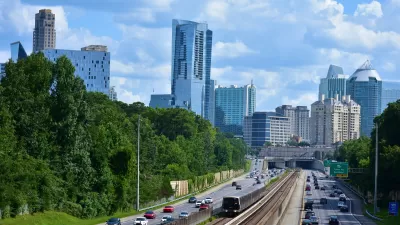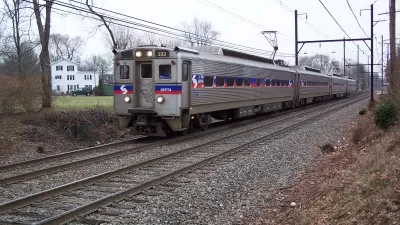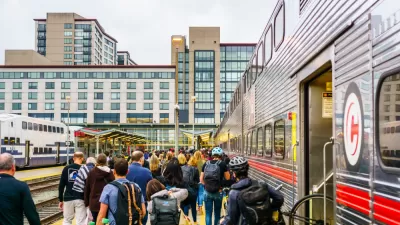It's the best and worst times for public transit. More travelers are turning to transit, but without additional subsidies, public transit across the U.S. is hurting. This editorial look toward the federal government to increase transit funding
"(T)he number of trips taken annually on public transit is now more than 10 billion and rising, compared with 7.8 billion trips in 1995, outstripping population growth and the number of miles traveled on streets and highways."
Yet federal funding has not increased. "Of the 18.4 cents per gallon federal gas tax, only 2.86 cents goes to public transit and almost all of the rest is reserved for highways." The tax has not increased since 1993, unlike transit fares that increase regularly.
"Ridership, which dipped during the recession in 2009, is rising again as more baby boomer retirees take buses and high gas prices push more people to try the thriftier option. Even some cities in areas dominated by cars - like Dallas and Salt Lake City - have expanded their public transit systems."
Consequently, the prediction for America's transit to meet the increased needs is not good.
"We will be back where we were in the 1970s and 1980s, where the older systems across the country are literally falling apart", warned Elliot Sander, chairman of the Regional Plan Association of NY, NJ, and CT.
Thanks to Tony Donovan
FULL STORY: The Recession Squeeze On Buses and Trains

Maui's Vacation Rental Debate Turns Ugly
Verbal attacks, misinformation campaigns and fistfights plague a high-stakes debate to convert thousands of vacation rentals into long-term housing.

Planetizen Federal Action Tracker
A weekly monitor of how Trump’s orders and actions are impacting planners and planning in America.

In Urban Planning, AI Prompting Could be the New Design Thinking
Creativity has long been key to great urban design. What if we see AI as our new creative partner?

King County Supportive Housing Program Offers Hope for Unhoused Residents
The county is taking a ‘Housing First’ approach that prioritizes getting people into housing, then offering wraparound supportive services.

Researchers Use AI to Get Clearer Picture of US Housing
Analysts are using artificial intelligence to supercharge their research by allowing them to comb through data faster. Though these AI tools can be error prone, they save time and housing researchers are optimistic about the future.

Making Shared Micromobility More Inclusive
Cities and shared mobility system operators can do more to include people with disabilities in planning and operations, per a new report.
Urban Design for Planners 1: Software Tools
This six-course series explores essential urban design concepts using open source software and equips planners with the tools they need to participate fully in the urban design process.
Planning for Universal Design
Learn the tools for implementing Universal Design in planning regulations.
planning NEXT
Appalachian Highlands Housing Partners
Mpact (founded as Rail~Volution)
City of Camden Redevelopment Agency
City of Astoria
City of Portland
City of Laramie





























